Artist Takes Ceramic Culture Global, Shares Jingdezhen's Stories
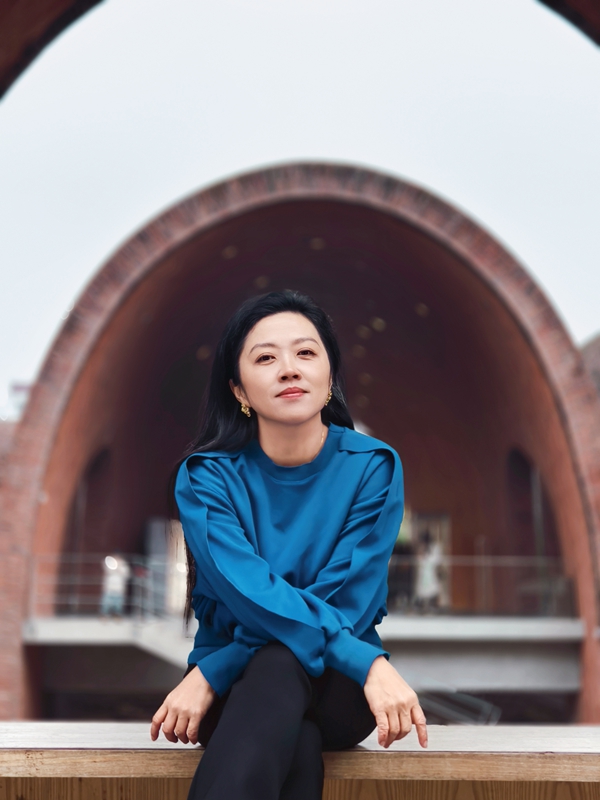 |
| Zhang Jingjing at Jingdezhen Imperial Kiln Museum [Photo by Cui Ligang] |
Zhang Jingjing, a ceramicist who resides in Jingdezhen, the world-famous "Millennium Porcelain Capital," in East China's Jiangxi Province, is committed to both ceramic art design and the creation and international dissemination of ceramic culture.
Zhang, who is dean of the International School of Jingdezhen Ceramic University (JCU), is also a witness to, participant of and contributor to Jingdezhen's development. In fact, she has been such for the past three decades.
"To make brighter the name card of Jingdezhen as the 'Millennium Porcelain Capital,' we should not only pay attention to the protection and inheritance of ceramic cultural heritage, but we should also promote the innovative development of ceramic art, through exchanges and mutual learning. At the same time, we should use ceramic art as a carrier to tell China's stories well, and to spread Chinese culture to the world," she says.
"I completed my studies in Jingdezhen, and Jingdezhen fostered my lifelong career. In the process of growing up with the city, I was deeply nourished by its ceramic culture. Since I was a college student, I have worked my way up to a practitioner and communicator of ceramic culture inheritance and innovation," Zhang says. Her passion for ceramic art is readily apparent.
Zhang has created numerous modern ceramic works of art, participated in various art exhibitions, at home and abroad, and won many domestic and international awards for her excellent works.
Zhang has long participated in international exchanges of ceramic culture; as such, she has visited many countries. She has utilized China's lowercase 'china' ceramic culture to tell the captivating story of uppercase 'China' to the world. "Ceramic culture can serve as a bridge to connect with the world, as ceramics is a good carrier for telling China's stories well and spreading Chinese culture," Zhang says.
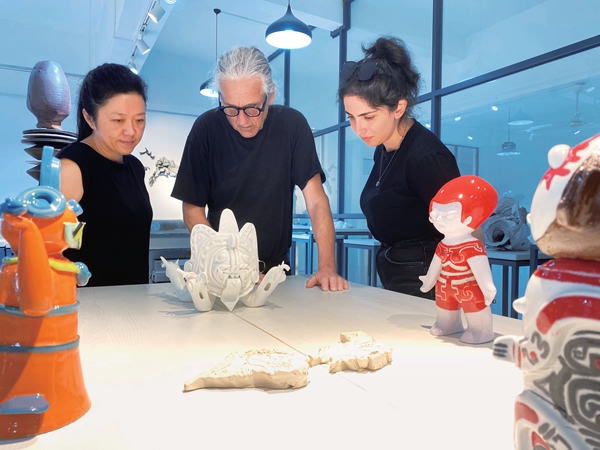 |
| Zhang Jingjing (left) with Torbjørn Kvasbø (middle), President of the International Academy of Ceramics, and another international artist. |
Innovation Key
As both a ceramicist and an educator, Zhang always attaches great importance to innovation. "Traditional ceramic craftsmanship has a rich history, and a cultural heritage, but inheritors should not just be immersed in tradition. What is more important for them is to find their innovative path, and to explore the future of ceramics. This is the foundation for the survival and development of ceramic art creation. Innovation is the driving force of Jingdezhen's future development," Zhang says.
She believes ceramicists should keep improving their skills and techniques while they are inheriting the traditional craftsmanship. Using blue and white porcelain as an example, Zhang says, "When painting on blue and white porcelain, we traditionally use a kind of brush pen, with the pen's head resembling a chicken head. Instead, I try to use other tools, such as oil brushes, to paint, which will make a new texture and give traditional blue and white porcelain a modern taste."
Jingdezhen's history of ceramic craftsmanship spans more than 2,000 years. Its historic role as an official and imperial kiln helped propel the art of porcelain making to unprecedented heights in China.
Today, Jingdezhen stands as China's only national ceramic culture inheritance and innovation pilot zone with an extensive network of supply chains and state-of-the-art facilities. By taking advantage of its ancient ceramic culture, Jingdezhen aims to become a national ceramic culture protection, inheritance and innovation base, a world-famous ceramic culture tourism destination, and an international ceramic cultural exchange, cooperation and trading center.
"From the name of the pilot zone, we can see the significance of inheritance and innovation. The ceramicists of other countries are also constantly seeking innovation on the basis of preserving tradition. We need to have a more open and inclusive perspective, enhance the internal driving force and vitality of the ceramic industry, and transform and upgrade the traditional ceramic industry, according to local conditions, with a pioneering and innovative spirit. We also need to strengthen the building of international-exchange platforms, and develop new quality productive forces, to promote the high-quality development of ceramic culture, in both Jingdezhen and the world," Zhang says.
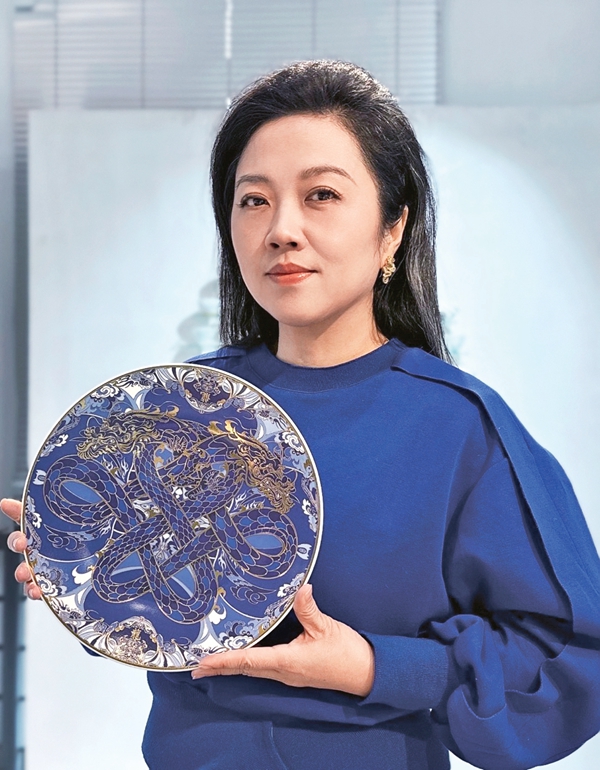 |
| Zhang Jingjing displays her ceramic work. |
The Application
On the morning of October 11, 2023, Xi Jinping, General Secretary of the Communist Party of China Central Committee, came to Jingdezhen for inspection. At Taoyangli Historical and Cultural Block, Xi visited Nanlu kiln ruins, the ceramic museum and the kilns cluster of the Ming (1368-1644) and Qing (1616-1911) dynasties. Xi stressed the importance of pooling talent from various fields to promote creative design and research and development innovation, further growing the ceramic industry and making brighter the name card of Jingdezhen as the "Millennium Porcelain Capital."
Earlier this year, Jingdezhen's government announced its three-year action plan regarding the city's application to become a UNESCO (United Nations Educational, Scientific and Cultural Organization) World Heritage Site.
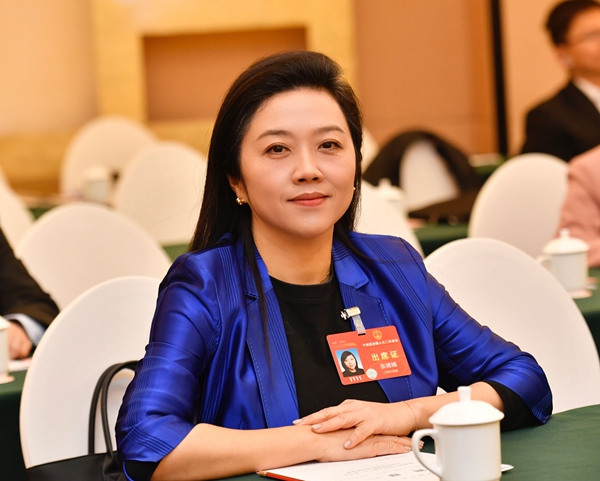
During this year's National People's Congress (NPC) session, in March, Zhang, an NPC deputy, advanced several proposals, including a proposal to support Jingdezhen's application to have all of its areas listed as a UNESCO World Heritage Site.
"The cultural heritage application for all of the city's areas is aimed at telling the story of Jingdezhen in a more comprehensive way," Zhang says.
"Jingdezhen boasts rich historical and cultural relics. In addition to relics that have been protected, places such as kiln sites, ancient docks and old streets have jointly built a complete system of the development of Jingdezhen's ceramic industry. They are an integral part of Jingdezhen's application to be a world heritage site," Zhang adds.
She advocates building both a cultural relics protection zone and an antique porcelain chip trading center, and she calls for accelerating the pace of innovation in developing Jingdezhen's ceramic and cultural tourism industries.
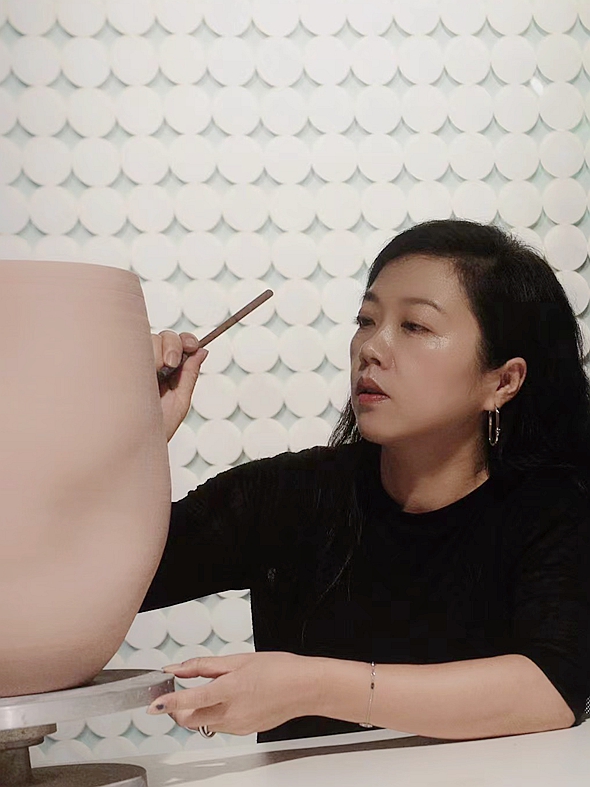 |
Promoting Ceramic Education
As the only multidisciplinary university in China with "ceramic" in its name, JCU has drawn more than 3,000 overseas students, from more than 60 countries or regions, since the 1950s.
As dean of JCU's International School, Zhang has contributed her wisdom and strength to the innovative development of ceramic culture, and to the international development of ceramic education. She has spared no effort in promoting international exchanges involving ceramic culture and education. The International Ceramic Workshop, which Zhang established, has received more than 1,000 visiting international artists.
"Jingdezhen is like a university, but without walls. The artworks, workshops and artists in the city are like treasure houses for students who are eager to learn," Zhang says. In addition to traditional ceramics courses, the school offers traditional Chinese culture courses, including calligraphy, Chinese painting and tea culture.
"I like China's ceramic and tea culture very much. I want to learn ceramics, the Chinese language and Chinese culture. In the future, I'd like to open a ceramic studio or a ceramic shopping center in my hometown," says a student from Cameroon, who uses the Chinese name Ma Kelin.
Zhang believes international students play a positive role in helping promote exchanges of ceramic culture between China and other countries. "With a deep love for ceramic culture, some students choose to stay in Jingdezhen to start their own businesses, and some return to their hometowns, or other countries, to teach ceramics courses, or to work in the ceramics industry. They are sowing the seeds of ceramic culture, and they are helping to make ceramic culture take root and blossom around the world. And this has led to deep integration of cultures," Zhang says.
Approximately 30,000 artists are residing in Jingdezhen, including an estimated 5,000 international artists, indicate incomplete statistics from Jingdezhen's government. The group of local artists is known as "jingpiao," while the international artists are known as "yangjingpiao."
Zhang says Jingdezhen is literally a magnet for overseas artists. In their eyes, Jingdezhen has become a window that allows them to experience China's development, and to perceive Chinese culture, giving them deep and lasting creativity. They have found a sense of belonging and fulfillment in Jingdezhen, where their dreams can be realized.
Jingdezhen has forged friendly relations with more than 180 cities in 72 countries or regions, and those relationships have facilitated numerous ceramic-themed exchanges and research activities. "Jingdezhen is an inclusive city full of vitality, which I think is the reason why the city is attractive to young people and foreigners," Zhang says.
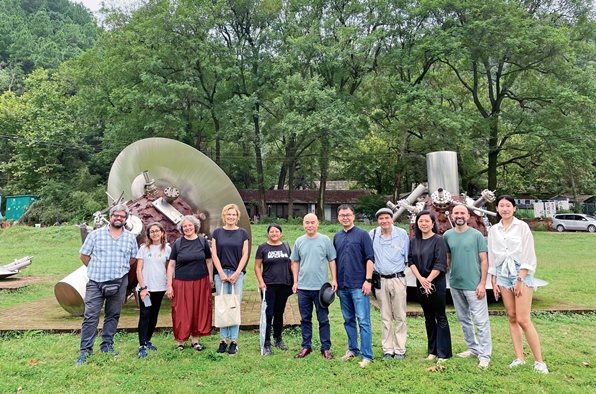 |
| Zhang Jingjing (third from right) leads international artists during their inspection tour of Jingdezhen. |
Cultural Exchanges
To better inherit and promote Chinese ceramic culture, JCU, in collaboration with relevant institutions, established the Belt and Road International Ceramic Education Alliance. In addition, JCU has established friendly and cooperative relations with more than 50 colleges or universities in the United States, United Kingdom and other countries or regions. The university also launched the "Tang Ying Porcelain Workshop" overseas ceramic-cultural center project.
Tang Ying (1682-1756) was the director of Jingdezhen Imperial Kiln Factory during the reign of Emperor Qianlong (1711-1799), of the Qing Dynasty. Famous for his rich ceramic-making theories, superb ceramic-making skills and noble spirit of making ceramics, Tang made great contributions to the ceramics industry in Jingdezhen.
"Named after Tang, the Tang Ying Porcelain Workshop aims to build a bridge of communications between Chinese ceramic culture and the world, through long-term and short-term practical training courses, ceramic-art exhibitions, ceramic-cultural lectures, ceramic-production experiences, and other ways," Zhang says.
Tang Ying Porcelain Workshops have been established in Dubai and Italy, and JCU has signed cooperation agreements, with several overseas universities, to establish the workshops.
During this year's NPC session, Zhang proposed the building of overseas ceramic-cultural centers be added to China's plan of building Chinese cultural centers in countries along the Belt and Road, to take Chinese culture global, and to create a new platform for cultural exchanges.
"Tang Ying Porcelain Workshop will open an important window that reveals the charm of Chinese ceramic culture to the world, so more people can deeply understand, personally experience and gradually fall in love with Chinese ceramic culture," Zhang says.
Photos from Interviewee
(Women of China English Monthly June 2024)
Editor: Wang Shasha
Please understand that womenofchina.cn,a non-profit, information-communication website, cannot reach every writer before using articles and images. For copyright issues, please contact us by emailing: website@womenofchina.cn. The articles published and opinions expressed on this website represent the opinions of writers and are not necessarily shared by womenofchina.cn.








.jpg)

 WeChat
WeChat Weibo
Weibo 京公网安备 11010102004314号
京公网安备 11010102004314号